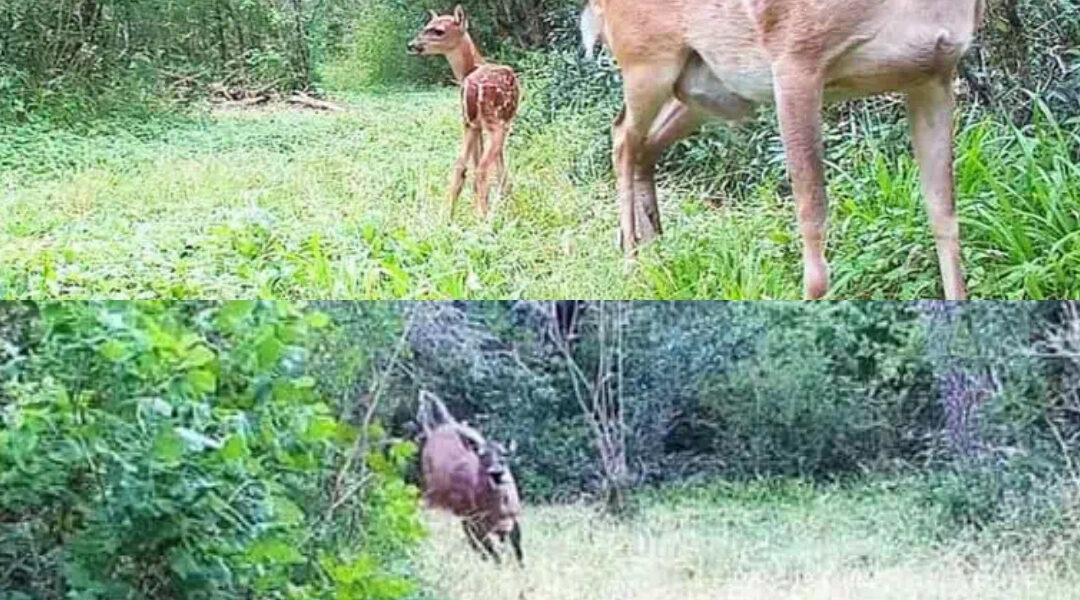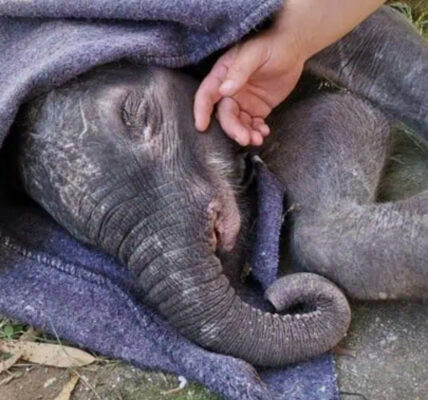It was a calm June morning — the kind where sunlight glimmers through the trees and the forest seems at peace. In a quiet meadow, a doe grazed gently beside her two newborn fawns. They were only a few weeks old, still wobbly on their legs, their white-spotted coats blending perfectly with the tall grass. For this mother, life was simple and beautiful: feed, protect, nurture. But peace in the wild is fragile — and danger often moves on silent feet.

From the shadows, two coyotes watched. Hunger had drawn them close, their eyes fixed on the tiny fawns. For predators, a young deer is easy prey. Yet this mother was no ordinary target. She had faced the wild before and survived. And when she sensed the threat — that subtle shift in the air, that unseen presence — her instincts ignited like fire.
The first coyote made its move, creeping low through the brush. The doe froze, her body tense, her ears locked on the sound. Then, without hesitation, she charged. Her hooves thundered across the ground, slicing through the still morning air. Startled, the coyote bolted, but the doe was faster. She lunged forward, hooves striking just inches from its flank, forcing it to retreat.
Her fawns stood trembling, hidden among the reeds, watching their mother transform from gentle guardian to fierce warrior.
But the danger wasn’t over. A second coyote circled from the opposite side, hoping to catch one of the fawns unguarded. The doe spotted it and wheeled around, her heart pounding. She lowered her head, snorted, and charged again. This time, she chased the predator deep into the woods — far enough to make it think twice about ever coming back.
The chase lasted nearly five minutes, her hooves churning up earth as she ran, unrelenting. Finally, the coyote vanished into the distance, beaten and afraid. The forest grew quiet again.
When she returned to the clearing, her sides heaved with exhaustion. Yet when she saw her fawns, her breath steadied. They stepped out cautiously, pressing close to her legs, their tiny bodies brushing against her fur. She nuzzled them gently, letting them know it was safe again.

For a brief, shining moment, the world was still.
But the wild is never predictable. Just as calm began to return, a flash of red fur appeared at the edge of the meadow — a fox, curious and cautious. The doe spotted it immediately. Though foxes rarely attack fawns, she wasn’t about to take chances. She stomped her hooves, a sharp warning that echoed through the clearing. Her body stood tall and rigid, her gaze locked. The fox hesitated, sensing the unspoken command. Within seconds, it turned and slipped quietly back into the forest.
The doe exhaled — a soft sound of relief and fatigue. Her fawns nestled close, their tiny tails flicking in the sunlight. They had survived not one, but two threats in a single morning, all because their mother refused to yield.
For hours afterward, she stood guard, ears twitching at every sound, her body between danger and her children. When the sun began to set, she finally led them to the edge of the woods, where the trees offered shelter and shadows for rest.

Later, the moment was captured on camera — a story of instinct, courage, and love that spread across the world. Viewers watched in awe as the doe charged fearlessly, defending her fragile young with the kind of bravery that comes from pure devotion.
Wildlife experts often say that survival in nature depends on instinct. But in this case, it was something deeper — something fiercely emotional. It was the bond between a mother and her young, a bond strong enough to face down hunger, fear, and death itself.
By the next morning, the meadow was quiet again. The sun rose over dew-covered grass, and the little family stood together, grazing softly — alive, unbroken, together.
The video of the encounter moved millions, not only because of the danger but because it revealed something universal. Love, it seemed, was not exclusive to humankind. It existed in every heartbeat, every act of protection, every creature willing to fight for another.
And in that still June morning, a mother deer reminded the world of a truth as old as time — that there is no force stronger, no courage greater, than a mother’s love.




